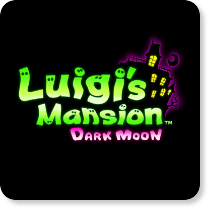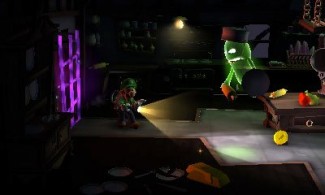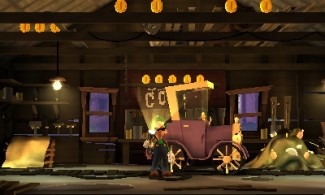Bastion
LQ: 9.15
Recommended Age: 10+
Skills Used: Planning, Working Memory, Mathematics, Reading

In this haunted adventure game, players lead Mario’s lesser known brother, Luigi, throughout various spooky locales in search of ghosts. After a monstrous apparition shatters the Dark Moon crystal, the tame and friendly ghosts inhabiting the mansions in Luigi’s neighborhood turn mischievous and hostile. With the assistance of Professor E. Gadd and his ghost-fighting tools, Luigi must summon the courage to visit these mansions and solve the mysteries laid within, restoring the town to its proper state. Luigi’s Mansion: Dark Moon contains no violence or harsh language, but features a suspenseful, supernatural atmosphere that may not be appropriate for children under the age of 6.
Getting started and then maintaining attention and effort to tasks.
Even early in his adventure, Luigi will be facing off against multiple ghosts at once, and dodging attacks while sucking them up with the "Poltergust 5000" requires keen timing and concentration. While Luigi isn't fending off these apparitions or using his wits to solve the mansions' various puzzles, he needs to keep an eye out for treasure, which can be used to buy upgrades to his equipment. Coins and other treasures are littered in every corner of the mansions, often hidden in drawers, up in the rafters or behind curtains. Players need to be more than just observant to find all these treasures, since most are kept from view and need to be uncovered using Luigi's equipment, or by exploring areas not marked on your map.
Being efficient and aware of our use of time and effort.
At the end of each level players' performances are judged on a 3-star scale, based on the time taken to complete the mission, the amount of damage received, and the total amount of treasure collected. These criteria rely heavily on the players ability to balance caution with speed, looking for clues and hidden caches of treasure while making sure to make good time and avoid careless mistakes. Players who rush through too fast will likely miss treasure and take damage, while those who are overly thorough will earn a poor time rating To earn a perfect score, players must balance the time element with the objectives of the level.
Adapting and adjusting to changing conditions and expectations

Between the ghostly encounters of the game, players must work to complete the objective(s) of each mission. While multiple missions can take place within the same mansion, the puzzles involved change, and no two puzzles are the same in the entire adventure. In the first mansion, Gloomy Manor, for example, the player is introduced, level-by-level, to each piece of equipment Luigi will be using for the remainder of the game. Even in these item-specific missions, the player must discover how to use each tool to solve a handful of different puzzles. For instance, after obtaining the Poltergust 5000, the player uses it to remove loose wallpaper and rugs to reveal hidden compartments, carry fire-coated objects, spin ceiling fans, and capture ghosts. In a later level in Gloomy Manor Luigi acquires a black-light attachment and suddenly areas that previously seemed to be fully searched are revealed to hold more secrets that appear only with this tool. The player cannot rely on previous mission's puzzles to answers because they are never repeated, too. Instead, the player must adapt to contextual clues and use their ability to improvise and shift strategies to solve the mysteries of the mansions.
Understanding and articulating her own thoughts and feelings
 After completing a mission, the game will remember the highest star-rating achieved, saving the time of completion, amount of damage taken, and total treasure collected. This allows players to judge their performance and be able to replay a level with an idea of what they must improve upon. For instance, taking 30 minutes to beat a mission may result in a two star rating. Seeing this, players can go back, knowing the solutions to the puzzles beforehand, and try to improve efficiency and beat the previous record. This self-assessment of progress is not as clear-cut when fighting the bosses in the last levels of each mansion, however. Here, bosses are essentially puzzles themselves, puzzles that fight back. Bosses aren't defeated by delivering a number of blows, either, but are beaten by performing very specific actions using the equipment available to Luigi. Reflecting on these situations and finding the right action encourages metacognitive thinking, helping players build an awareness of their own behavior's impact on the environment, and figuring out what tactics employed are most successful.
After completing a mission, the game will remember the highest star-rating achieved, saving the time of completion, amount of damage taken, and total treasure collected. This allows players to judge their performance and be able to replay a level with an idea of what they must improve upon. For instance, taking 30 minutes to beat a mission may result in a two star rating. Seeing this, players can go back, knowing the solutions to the puzzles beforehand, and try to improve efficiency and beat the previous record. This self-assessment of progress is not as clear-cut when fighting the bosses in the last levels of each mansion, however. Here, bosses are essentially puzzles themselves, puzzles that fight back. Bosses aren't defeated by delivering a number of blows, either, but are beaten by performing very specific actions using the equipment available to Luigi. Reflecting on these situations and finding the right action encourages metacognitive thinking, helping players build an awareness of their own behavior's impact on the environment, and figuring out what tactics employed are most successful.
All membership plans come with full access to our entire suite of tools learning guides, and resources. Here are a few of the ones we think you’ll like the most: